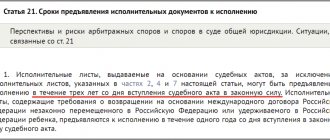A writ of execution is a document issued by a judicial authority after the judge’s decision has entered into force. The initiator of its issuance is usually the plaintiff in the case. In some cases, for example, when collecting funds from the budget, the document is sent directly to the judicial authority for further execution.
A writ of execution is the basis for FSSP employees to initiate enforcement proceedings, within the framework of which debt collection is carried out. Current legislation provides bailiffs with an extensive range of powers, which is constantly expanding. Therefore, there is nothing surprising in the relevance of the question of whether it is possible to challenge a writ of execution before or already during the work of the bailiffs? The answer is contained in the article.
Is it possible to appeal a writ of execution?
A writ of execution is a document that is issued to the plaintiff based on his application after the court decision has entered into force. Sometimes it is sent directly to the FSSP authorities, for example, if there is a need to recover funds from the budget. IL is the basis for the initiation of proceedings by bailiffs.
Regarding the question of whether this document can be appealed, the legislation gives a negative answer. Only a court decision can be challenged.
Time limits for initiating enforcement proceedings
The time allotted for the bailiff to initiate enforcement proceedings is three days from the date of receipt of the enforcement document.
At the same time, a deadline must be established for the manifestation of the voluntary nature of fulfillment of the requirements contained in the executive document.
As a rule, it does not exceed five days. After making such a decision, the bailiff sends the entire package of documents to the debtor.
After considering the period for initiating enforcement proceedings on a court order, allotted for the bailiff to make a decision, it is necessary to touch upon the legality of the bailiff’s actions.
As mentioned above, if the debtor was not familiar with the executive document, the moment of entry into legal force did not occur. Consequently, the FSSP initiated enforcement proceedings without grounds.
In this case, in order to cancel the enforcement proceedings, it is necessary to obtain the cancellation of the court order. To find out how to do this, read the article further.
Grounds for challenging a writ of execution
To appeal the IL, there must be valid grounds. According to the Code of Civil Procedure of the Russian Federation, these include:
- erroneous interpretation of the circumstances of the case;
- lack of convincing evidence;
- inconsistency of the decision made with the circumstances of the case;
- incorrect application of the norms of current legislation when rendering a verdict;
- application of legislative acts that are not suitable for the given circumstances of the case;
- non-enforcement of laws to be used;
- misinterpretation of legislation;
- consideration of the case in an illegal court composition;
- violation of the requirements for notifying the parties about the upcoming meeting;
- violation of the rules of the court hearing, for example, presentation of the circumstances of the case in a language incomprehensible to the listeners;
- incorrect execution of the protocol or its absence;
- violation of the procedure for making a court decision.
Attention! If difficulties arise in formulating the grounds for appealing the writ of execution, it is recommended to seek help from a lawyer. A qualified specialist will help determine the reasons for filing an appeal in accordance with the law.
Application for termination of enforcement proceedings from the debtor
Along with other grounds, to complete the collection procedure, there is a request for termination of enforcement proceedings from the debtor. In our article we will consider in what situations it is possible to terminate proceedings at the request of the debtor and how this can be done.
Both the bailiff and the judicial authority directly can complete enforcement proceedings initiated against the debtor. The latter is entitled to complete the proceedings if:
- the debtor or claimant has died and the nature of the obligations is such that they cannot be inherited by the heirs of the deceased;
- the opportunity for the debtor to perform actions necessary to fulfill obligations is lost;
- the claimant refuses to accept the thing confiscated from the debtor as payment for the fulfillment of obligations;
- there are other grounds provided by law.
The bailiff terminates enforcement proceedings in the following cases:
- if the court decides to terminate the execution; or the claimant’s refusal to collect has been accepted; or the document on the basis of which the writ of execution was issued has been cancelled; or a settlement agreement between the parties to the proceedings has been approved;
- if the debtor or claimant organization was excluded from the register of legal entities - officially liquidated;
- if a writ of execution was issued in relation to a child illegally imported into Russia, and during the period of carrying out the activities the child reached an age that does not allow execution to be carried out against him;
- in other cases provided for by law.
The collection procedure can be completed by the debtor’s application to terminate enforcement proceedings in cases where:
- an amicable agreement has been reached between the claimant and the debtor;
- the deadline for this type of execution established by law has been exceeded;
- the claimant has died, and his heirs cannot inherit the right of claim under a specific enforcement proceeding;
- the basic document on the basis of which the writ of execution was issued was cancelled.
How to challenge a writ of execution
To challenge the IL, you must adhere to the procedure and deadlines for appealing it.
Dear readers ! To solve exactly your problem, contact our online consultant on the website. It's free. For any region.
Dear readers ! To solve exactly your problem, contact our online consultant on the website. It's free. For any region.
Where to contact
Only a higher authority can cancel a decision or make changes to it. The case is initially heard by the district or city court, and the review is carried out by the appellate judicial body. Due to the fact that the IL is issued to the claimant after the expiration of the period for appealing the decision, a statement of disagreement with it should be filed with a court of third instance, namely the court of cassation.
Time limits for challenging a writ of execution
The period for appealing the decision is 30 days from the date of its adoption. Until the end of this period, the issuance of IL is prohibited.
The procedure for challenging a writ of execution through court
The procedure for challenging IL consists of several stages:
- Determining the grounds for starting the procedure for appealing a document, taking into account the specifics of the case. It is important to correctly determine the type of proceedings: civil, arbitration or criminal.
- Drawing up an application and submitting documents to the court.
- Confirming your own position with evidence.
- Participation in proceedings conducted by a higher court.
Some important points of enforcement proceedings
First, let's talk about other circumstances, the presence of which entails the termination of enforcement proceedings by court order.
Here are some of them:
- Exclusion from the Unified State Register of Legal Entities. In cases where a court order is issued against a legal entity.
- Recognition of the executive document as invalid. This can happen, one of the conditions was stated above. For consultations directly on your question, call us.
- In case of death of the claimant or debtor.
- Expiration of the statute of limitations for initiating enforcement proceedings.
Among other things, it is necessary to reflect one more issue, which is far from of secondary importance. It concerns the collection of performance fees.
The moment that is considered the beginning of the possible accrual of such a fee is the end of the period for voluntary compliance with the requirements of the court order.
This approach is established by law. Despite the fact that it is not entirely fair, it must be recognized as justified. After all, the claimant also paid the state duty. And only because the court order was paid, it was issued to the plaintiff.
Appeal a writ of execution on a loan
Often, borrowers with overdue loan obligations learn about the existence of an order and writ of execution for debt collection from a letter found in the mailbox. The fact is that in order to issue a court order in a simplified manner, the presence of the plaintiff and the defendant is not required. However, appealing it is much easier than challenging a court decision made through a lawsuit.
To cancel the order, it is sufficient to express the formal disagreement of the defendant. But it must be taken into account that the plaintiff has the right to file a statement of claim to have the case considered in the usual manner.
Settlement agreement
If the court order has acquired the legal force of an executive document, then it is necessary to act in the direction of concluding a settlement agreement.
Often, in order to begin negotiations with a creditor, people resort to the help of a professional lawyer. This option is the most suitable.
- Because the relationship between the debtor and the collector is already “strained” in nature.
- It is easier for a qualified specialist to operate with various arguments. After all, he relies on both professional experience and existing knowledge.
A necessary condition for the cancellation and termination of enforcement proceedings, after the conclusion of a settlement agreement, is the mandatory certification of the agreement by the court. Only in this case will the bailiff have all the legal grounds to terminate the forced collection.
Rules for writing an application to terminate proceedings addressed to a bailiff
An application for termination of enforcement proceedings from the debtor addressed to the bailiff is written in free form, but the document must be drawn up in such a way as to enable the bailiff to assess the seriousness of the circumstances. The wording of the statement must be clear and precise, which will allow the issue to be resolved positively. The application addressed to the bailiff must have the following structure:
- The name of the department to which the document is sent, details of the bailiff considering the case, and information about the applicant with contact details (in the upper right corner) are indicated.
- The name of the document is written in the middle of the sheet.
- The main text is drawn up in the form of a message stating that the bailiff is processing a case (indicate the case number and date of initiation) of collection from the debtor in favor of the claimant (indicate the data of both parties). Data on the main document on the basis of which enforcement proceedings were initiated are also indicated.
- On a new line, it is necessary to describe the request to terminate production and list the circumstances that allow this to be done.
- Prescribe a list of attachments to the application - these are documents confirming the occurrence of circumstances that provide the right to make a decision to terminate execution.
- The document ends with the date and signature of the debtor.
The bailiff, within 3 days from the receipt of the application from the debtor, must consider it and make a decision to terminate the case.
Termination of enforcement proceedings: consequences
In accordance with Article 44 of the Law on Enforcement Proceedings, termination of enforcement procedures has a number of consequences:
- When the proceedings are terminated, the bailiff cancels all enforcement actions against the debtor, including lifting the seizure of the property, and also lifting other imposed restrictions, for example, a ban on crossing the border, while a note is made in the documents that the obligations have been fulfilled in full or in part.
- As a rule, the termination of enforcement proceedings immediately entails the initiation of a new one for the collection of unpaid enforcement fees and other expenses. An exception may be situations when the court document that was the basis for issuing the writ of execution has been cancelled. It is worth noting that the initiation of proceedings for the collection of fees may preserve all the restrictions that were previously applied to the debtor.
- Documents that accompany the event to terminate enforcement proceedings must be sent to all parties to the case, to the judicial authorities, as well as to organizations carrying out the implementation of restrictive measures against the debtor. The deadline for sending documents to the bailiff is 3 days.
Important! If the enforcement case is completed, the writ of execution or other document that was the basis for the collection procedure remains in the case file and cannot be reused.
Rules for writing an application to terminate proceedings in court
The form and content of such an application are practically no different from the document that can be prepared addressed to the bailiff. The only difference is the addressee in the header of the application, which will directly be the district or arbitration court. An application for termination of enforcement proceedings is sent to the district court where the bailiff carries out his activities in a specific proceeding. The court is given 10 days to consider this application, and all parties to the case and the bailiff must be notified of the meeting. However, if someone notified does not appear in court on the appointed day, the application will still be considered. If a party to the collection procedure is an organization or an individual entrepreneur, then an application to terminate the proceedings should be submitted to the arbitration court that issued the writ of execution, or in the area where the bailiff conducting the case operates. The arbitration court also considers the case within 10 days.






